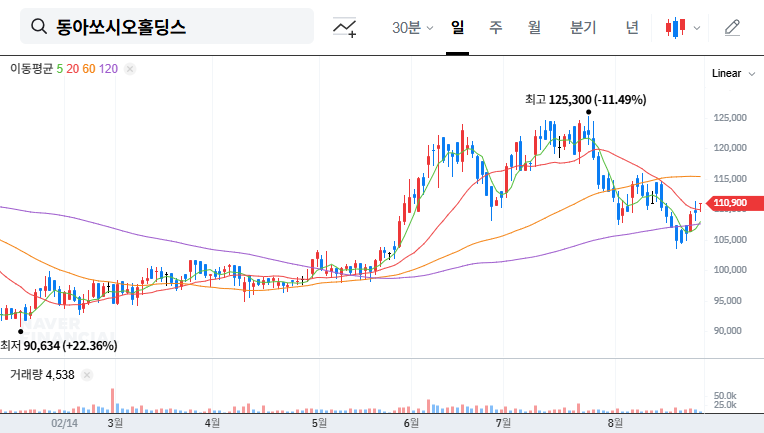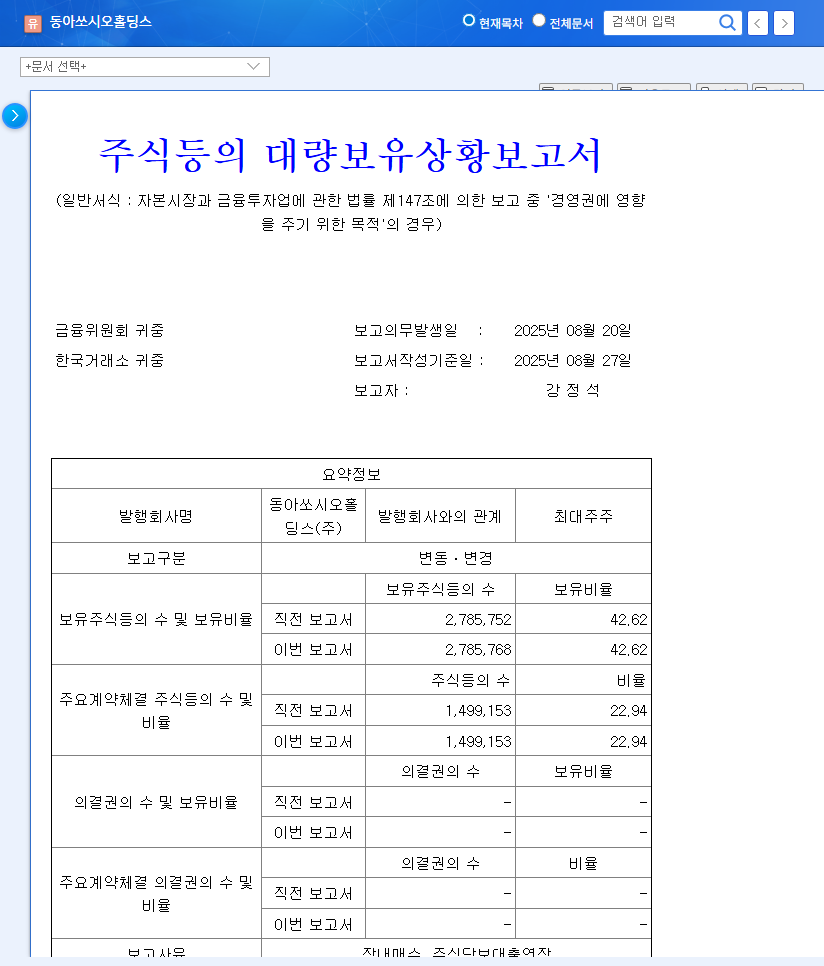Dong-A Socio Holdings Declares 700 KRW Cash Dividend: What Investors Should Focus On
Dong-A Socio Holdings announced on July 16, 2025, a cash dividend of 700 KRW per common share for its third-quarter business. This can be interpreted as a positive signal providing short-term returns to shareholders. However, the low dividend yield of 0.6% relative to the current stock price (551 KRW), the recently released sluggish Q1 performance, and a high debt ratio necessitate a cautious approach from investors.
1. What Changes with the 700 KRW Cash Dividend Decision?
Let’s review the key details of this dividend decision:
- Dividend Amount: 700 KRW per common share
- Dividend Yield: 0.6% based on the current stock price of 551 KRW
- Record Date: July 31, 2025
- Payment Date: August 14, 2025
2. How Did Dong-A Socio Holdings Perform in Q1 2025?
Dong-A Socio Holdings’ Q1 2025 financial performance was somewhat disappointing:
- Consolidated Basis:
- Revenue: 328.4 billion KRW (a 7.3% increase YoY)
- Operating Profit: 20.3 billion KRW (a 12.9% decrease YoY)
- Separate Basis:
- Revenue: 36 billion KRW (a 3.9% decrease YoY)
- Operating Profit: 28 billion KRW (a 7.2% decrease YoY)
The decrease in operating profit is attributed to a combination of factors including rising raw material and labor costs in the Over-The-Counter (OTC) drug segment, increased selling, general, and administrative (SG&A) expenses, reduced dividend income from subsidiaries, and higher amortization of intangible assets. On the other hand, the biosimilar, contract manufacturing, and logistics divisions showed robust growth.
3. Dividend Decision: Positive vs. Negative Impacts
The potential impacts of this dividend decision on Dong-A Socio Holdings’ stock price and investor sentiment can be analyzed as follows:
3.1 Positive Impacts
- Enhanced Shareholder-Friendly Image: Consistent dividends signal the company’s commitment to enhancing shareholder value and can positively influence the stock price in the long run. Especially when the stock is relatively undervalued, dividends can increase its investment appeal.
- Potential for Short-Term Stock Price Rise: The anticipation of dividends may lead investors to buy shares, potentially driving a short-term stock price increase before the ex-dividend date.
- Indication of Financial Stability: The ability to pay a substantial dividend suggests the company has secured a certain level of cash flow, which can boost confidence in its financial stability. (However, the high debt ratio of 91.15% must be considered.)
3.2 Negative Impacts
- Low Dividend Yield: A dividend yield of 0.6% may not be attractive to investors, potentially leading to capital flows towards higher-yielding stocks.
- Loss of Reinvestment Opportunities: Funds paid out as dividends could have been reinvested to fuel corporate growth, thus incurring an opportunity cost for growth.
- Potential for Short-Term Stock Price Decline (Ex-Dividend): The stock price may fall by the amount of the dividend on the ex-dividend date due to the ex-dividend effect.
3.3 Neutral Impacts
- Uncertainty in Market Reaction: The market’s reaction to the dividend announcement is unpredictable. Negative factors such as sluggish Q1 performance and a high debt ratio could offset the positive effects of the dividend.
4. Macroeconomic and Market Conditions: Key Variables
Macroeconomic and market conditions both domestically and internationally are crucial variables in making investment decisions for Dong-A Socio Holdings.
- Interest Rate and Exchange Rate Fluctuations: Rising US benchmark interest rates and Treasury yields, along with increased volatility in USD/KRW and EUR/KRW exchange rates, can lead to higher funding costs and exchange rate risks.
- Oil and Gold Prices: Fluctuations in international oil and gold prices can impact raw material costs, negatively affecting profitability.
- Intensifying Competition in the Biosimilar Market: Increased competition in the biosimilar market adds uncertainty to Dong-A Socio Holdings’ growth prospects.
5. Investment Strategy: How Should It Be Formulated?
Overall, while the 700 KRW dividend provides short-term benefits, the limited investment appeal for the long term is evident given the Q1 performance slump and high debt ratio. Making investment decisions solely based on the dividend amount is risky. Therefore, a strategic approach is necessary:
- Regular Performance Monitoring: Continuously track information regarding Dong-A Socio Holdings’ Q2 performance and future business strategies. Pay close attention to the growth trajectory of the biosimilar and logistics divisions.
- Assess Financial Health Improvement: Closely monitor the company’s specific plans and execution for reducing its high debt ratio.
- Watch Macroeconomic Indicators: Analyze the impact of changes in macroeconomic indicators such as interest rates, exchange rates, and oil prices on the company’s performance.
- Analyze Long-Term Growth Strategy: Evaluate the company’s future value by understanding its long-term growth strategy and risk management plans.
This report is based on the provided information, and investment decisions should be made cautiously and at the investor’s own risk.
Will Dong-A Socio Holdings’ stock price rise due to this dividend decision?
There is a possibility of a short-term stock price increase before the ex-dividend date due to buying interest from investors anticipating the dividend. However, the extent of the rise may be limited, or the price could even fall due to negative factors like sluggish Q1 performance, a high debt ratio, and overall market conditions. Therefore, cautious observation is necessary.
Is a 0.6% dividend yield worth investing in?
A 0.6% dividend yield may not be attractive compared to current interest rates or other high-dividend stocks. Instead of investing solely based on the dividend yield, investors should make judgments by comprehensively considering the company’s long-term growth potential, financial health, and the sustainability of its dividend policy.
Why was Dong-A Socio Holdings’ performance poor?
The decrease in operating profit for Q1 resulted from a combination of factors, including rising raw material and labor costs in the OTC drug segment, increased SG&A expenses, reduced dividend income from subsidiaries, and higher amortization of intangible assets. However, the biosimilar and logistics divisions showed growth.
What is the investment outlook for Dong-A Socio Holdings?
Currently, factors such as sluggish Q1 performance, a high debt ratio, and uncertain macroeconomic environments limit its investment appeal. It is crucial to closely monitor the performance of its biosimilar business, efforts to improve its financial structure, and the earnings trend from Q2 onwards before making investment decisions.
What should I check for in case of a stock price decline?
To prepare for potential stock price declines, you should continuously monitor the earnings outlook beyond Q2, the competitiveness in the biosimilar market, plans for debt ratio improvement, and overall market conditions. Understanding the company’s business model and competitive advantages is also important.


